Foreign education faces bleak future
As universities worldwide close their campuses, the future that a foreign education promised is suddenly looking grim


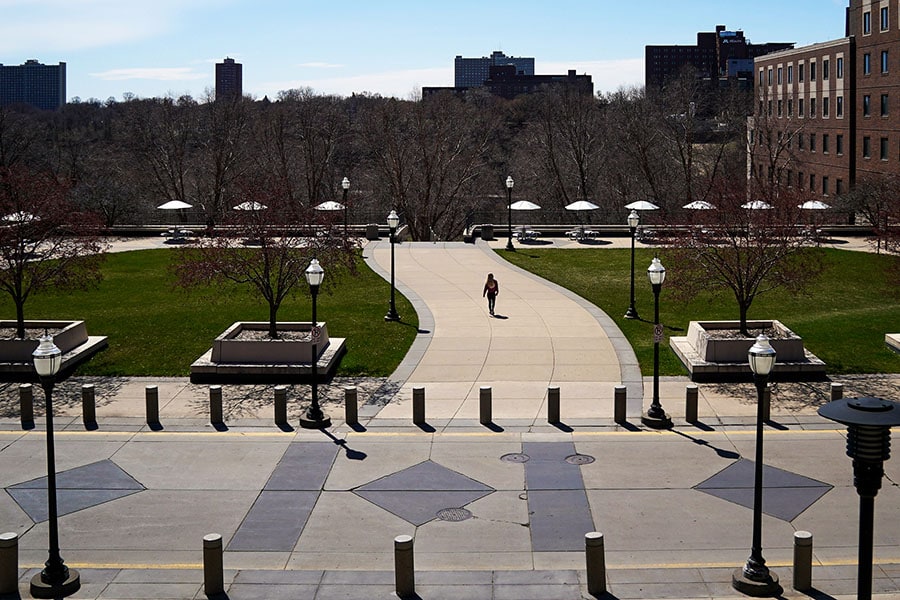 Like most campuses in the US, the University of Minnesota wears a deserted look mid-April as lectures were suspended in the wake of the Covid-19 pandemic. Classes in universities across the country are now being conducted online
Like most campuses in the US, the University of Minnesota wears a deserted look mid-April as lectures were suspended in the wake of the Covid-19 pandemic. Classes in universities across the country are now being conducted online
Image: Glen Stubbe / Star Tribune via Getty ImagesEvery morning, Aditya Sarda leaves his rented accommodation in New Jersey, US, and drives for about an hour in a friend’s car to reach, by 8.30 am, a construction site in Brooklyn, New York City, the Covid-19 hotspot in the US. The second-year student of masters in construction engineering and management at Stevens Institute of Technology is also an assistant project manager at the construction site of the Brooklyn high rise. Till May 11, the city had 335,000 confirmed cases of the coronavirus and 21,478 deaths from the infection.
“If I am not working, I am not making money,” says Aditya, 24, who chose to stay on in the US after his college announced that classes will not be conducted on campus any longer, and will move online he is scheduled to graduate from his two-year course at the end of May. “I now have a job, which means I can stay on in the US for up to three years after I graduate. If I went back to India, I would lose this job, and would not know if I could get another one in the US later.”
That is why, when the Indian government started repatriating Indians from the US on May 9—the first of the initial seven non-scheduled commercial flights took off from San Francisco—boarding one of those flights was not an option for Sarda. For the sake of a career in the construction industry in the US, he feels it is better to stay on in the US—the worst-hit country in the pandemic—despite his family’s pleas to take one of the repatriation flights and head home to Nagpur.
It was not an option for Kahan Shah either, who is now staying with his sister in Maryland, after classes at Boston College’s Carroll School of Management, where he is studying for a masters in finance, moved online. “I have time till December to get a job, and if I do, I can stay in the US for three more years,” says Shah. “But if I don’t, I will have to return to India.”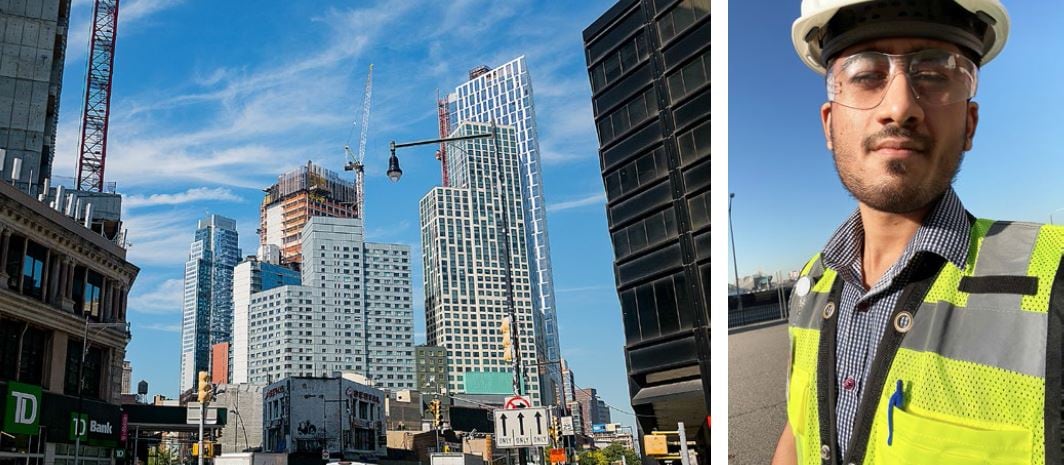 (From left) A view of high rises at Flatbush Avenue in Brooklyn, New York, which is a Covid-19 hotspot in the US Aditya Sarda, 24, a student of masters in construction engineering and management at Stevens Institute of Technology, decided to keep his job as an assistant manager at a Brooklyn high-rise during the pandemic instead of returning home to Nagpur in a repatriation flight
(From left) A view of high rises at Flatbush Avenue in Brooklyn, New York, which is a Covid-19 hotspot in the US Aditya Sarda, 24, a student of masters in construction engineering and management at Stevens Institute of Technology, decided to keep his job as an assistant manager at a Brooklyn high-rise during the pandemic instead of returning home to Nagpur in a repatriation flight
Image: (left)Epics / Getty Images[br]According to the ministry of external affairs, it is estimated that there are 10.9 lakh Indians enrolled in foreign universities, as of July 2019. The number is likely to have changed, with fresh admissions having taken place for courses that began in August-September 2019 and February-March 2020. The Covid-19 pandemic has seen universities across the world stop on-campus classes, and move them online many have also closed their accommodation facilities, asking students to move out of their hostel rooms within days. While students with friends or relatives in the same country have been lucky to find homes to put up in, others scrambled to get flights back to India before the country banned all international flights on March 22. Worse still has been the loss of part-time jobs that are crucial for many to pay their rents and buy groceries.
As India began one of its largest repatriation exercises, flights from San Francisco, London, Kuala Lumpur, Manila, Dubai, Abu Dhabi and Dhaka brought Indian citizens back home from different countries till May 11. In the following days, about 15,000 Indians are expected to return from 12 countries. Students constituted the largest group—about 34 percent—of the total number of 67,833 people who had registered for repatriation flights. But with tickets costing far more than the usual fare, this is not a feasible option for everyone. For instance, while the fare for a round trip from India to San Francisco can normally cost about ₹75,000, Minister of State for Civil Aviation Hardeep Singh Puri said that a one-way trip repatriation flight ticket from San Francisco to India will cost ₹1 lakh.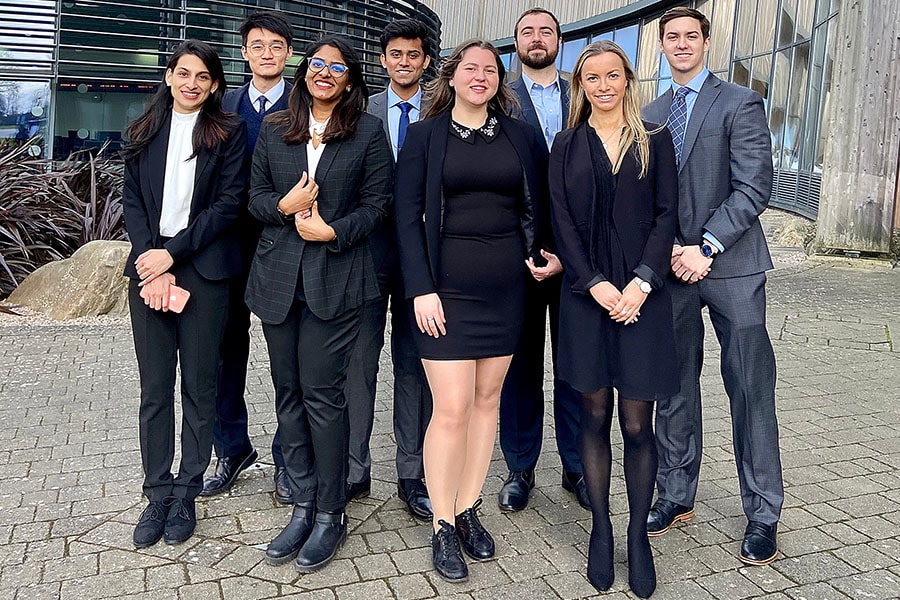 Krishnav Sarda (fourth from left), a student of masters in finance at the University of Reading in the UK, is back home in Mumbai after classes were moved online on March 16How have universities responded?
Krishnav Sarda (fourth from left), a student of masters in finance at the University of Reading in the UK, is back home in Mumbai after classes were moved online on March 16How have universities responded?
As the pandemic spread across countries in March, universities reacted differently to the situation. “The UK was not keen on starting with a lockdown and the universities were working as normal,” says Krishnav Sarda, who is studying for a masters in finance at the University of Reading. “Students were getting nervous because people were still travelling to and fro from Europe. It was only on March 16 that my university decided to shift classes online, when a visiting student from Europe was suspected to have tested positive for Covid-19.” By March 18, Krishnav was back at home in Mumbai.
For Dhruva Rao, an 18-year-old second-year student of general engineering at the University of Illinois, Urbana-Champaign, US, classes continued as normal till about March 7. “In the last week before spring break, which started on March 14, on-campus instructions was suspended. It wasn’t official from the university, but some professors individually asked us not to come to class,” says Rao. It was on March 11 that the students received an official email that said all on-campus classes would stop till the end of the semester, and that all students who could vacate the university accommodations should do so. Rao, who is an Overseas Citizen of India (OCI), could not return home to Delhi since India barred all forms of visa holders from entering the country. He has since moved in with his aunt who lives in California.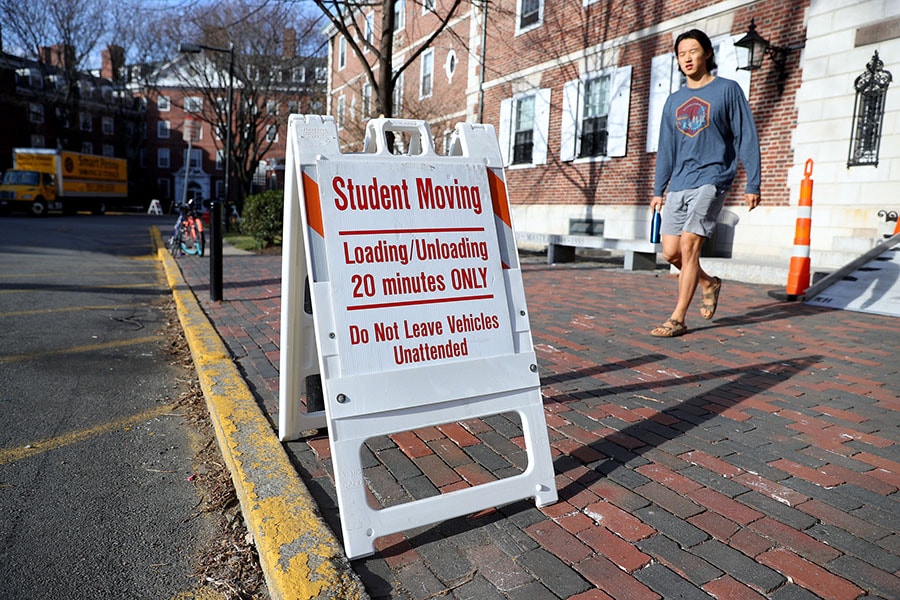 Harvard University in the US, which asked students to move out of their dorms due to Covid-19, puts up a sign warning them of a 20-minute parking restriction for loading and unloading their luggage
Harvard University in the US, which asked students to move out of their dorms due to Covid-19, puts up a sign warning them of a 20-minute parking restriction for loading and unloading their luggage
Image: Maddie Meyer / Getty ImagesLike Rao, 18-year-old Ishika Rishi, who is an undergraduate student of literature and critical theory at the University of Toronto, Canada, got just two days to move out of her university accommodation. “We then got an extension of another three days, but we all had to leave,” says Rishi, who is now staying in Toronto with a friend from her university. “We were not told anything about following sessions, but the summer session is now entirely online.”
Universities have also responded differently where financial aid and refund of fees are concerned. “For this semester, my university did refund some part of the fees, but not a significant amount,” says Rao. Krishnav says students at Reading University who left the UK have got the option to not pay rent for their university accommodation. “Universities have also started student funding organisations that are financially helping students who have lost their part-time jobs and are finding it difficult to sustain themselves,” he adds.
Salone Mittal, for instance, has received AUD$1,500 from Deakin University, Australia, where she started her MBA this March. “We had just started our second week at the university when it shut down because of the pandemic,” says the 23-year-old from Jalandhar.
“International students who don’t have part-time jobs can apply for funds to the university. Some of the students who have part-time jobs at restaurants are still able to continue with them, since they can serve take-away customers.”
She also adds that Deakin University is probably an exception in the aid it is providing. “I know of Indian students in other universities who are under stress, and can’t pay for their rent or buy groceries,” says Mittal. “This is largely because they have lost their part-time jobs, and their families back home are not in a position to send money. Students who have families here are especially hard-pressed. The Indian community is helping them with free groceries or financial aid.” Mittal herself is struggling to get a fourth flatmate in her shared private accommodation, and is having to pay more rent than what she had budgeted for.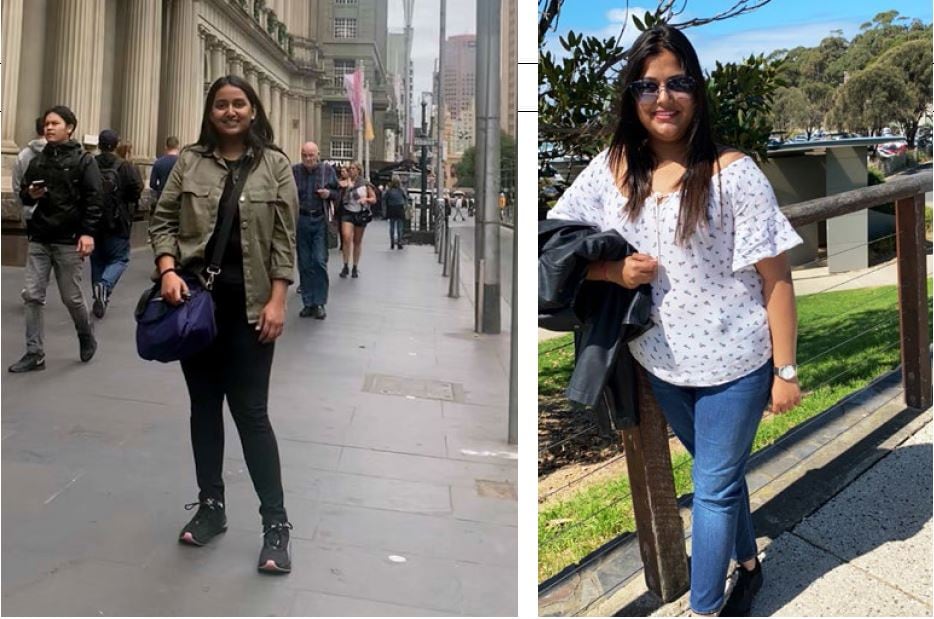 (From left) Nikita Gupta, a business analytics student at the Victoria University in Melbourne, believes that online classes cannot recreate the on-campus expericence Salone Mittal has received an aid of AUD$1,500 from the Deakin University in Australia, where she is pursuing an MBAQuality of classes / fees refund
(From left) Nikita Gupta, a business analytics student at the Victoria University in Melbourne, believes that online classes cannot recreate the on-campus expericence Salone Mittal has received an aid of AUD$1,500 from the Deakin University in Australia, where she is pursuing an MBAQuality of classes / fees refund
All the students that Forbes India spoke to agreed that although lectures are being conducted online, and there is scope to interact with professors through emails and calls, the experience is not the same. “Most courses have enough capabilities and recorded material to go online at any point of time,” says Rao of his engineering course. “For some courses, the professors recorded their class lectures and these went online on websites like Compass 2G. All assignments and quizzes were also posted on the portal, and we took our exams remotely.”
Although attending lectures is now a more relaxed activity—“you can take your lectures whenever you want, pause the video and go back to them to understand something better,” says Rao—the experience does not match up to being in class, on campus. “I don’t think I would be comfortable with this form of learning in the long-term. The only thing that is keeping us going is the hope that we will be back on campus soon and everything will be normal.”
Nikita Gupta, who started her masters in business analytics programme this March at Victoria University in Melbourne, Australia, says the pandemic-related lockdown started two weeks into her course. “All classes on campus were stopped, and they moved online. We submit assignments through Dropbox,” says the 22-year-old. “Although our teachers are trying their best, actual classes are always better. We do have the opportunity to contact our teachers and have consultations over Zoom, but it is difficult because the timings of these sessions might overlap with some other classes.”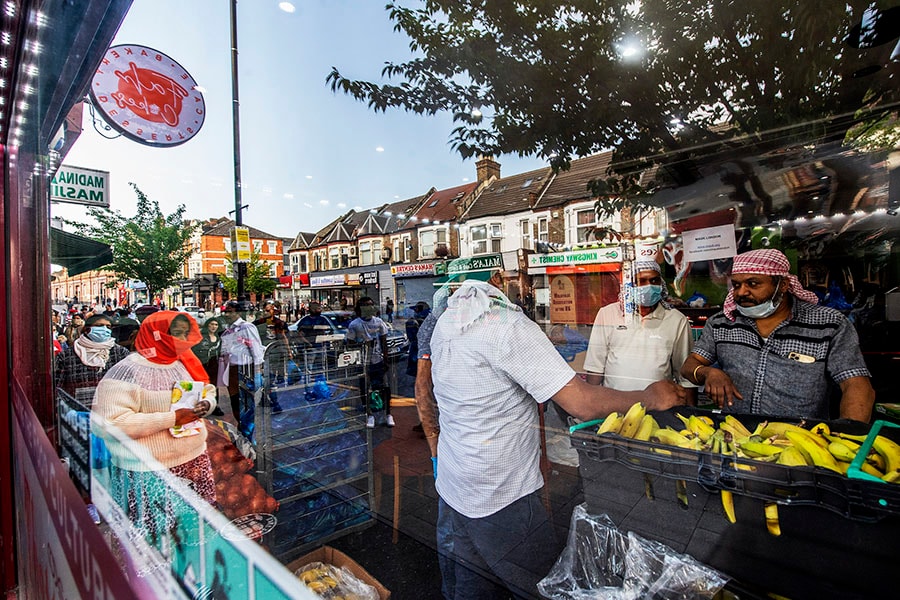 Members of the Indian community settled abroad, like the ones from UK seen here, are providing groceries and monetary aid to students from India stranded overseasIshika Rishi, in Toronto, says while for smaller classes, with 25 to 30 students, there are live lectures online, for larger classes, the lectures are pre-recorded and uploaded. “Right now it feels okay because the summer course-load is not intense. But for the fall session, online classes would not be sufficient, especially for workshop-based classes.”
Members of the Indian community settled abroad, like the ones from UK seen here, are providing groceries and monetary aid to students from India stranded overseasIshika Rishi, in Toronto, says while for smaller classes, with 25 to 30 students, there are live lectures online, for larger classes, the lectures are pre-recorded and uploaded. “Right now it feels okay because the summer course-load is not intense. But for the fall session, online classes would not be sufficient, especially for workshop-based classes.”
For those like Rao and Rishi, enrolled in four-year courses, the current disruption in their academic careers is less impactful, compared to those who are enrolled in one-year courses. Out of 12 months, at least five are now off-campus. Shah, from Boston College, feels that online classes are a raw deal. “Anyone who is paying for their own course, and especially at private universities, is a paying a lot of money. And that is not simply for the classroom education, but the entire campus experience. Having online classes is simply not worth this amount of money.” He estimates that tuition fees for a year in private universities are between $50,000 and $60,000, while living costs amount to about $24,000 a year. “My father now understands that this is a waste of money, especially since the job prospects now look bleaker than before.”
Shah’s sentiments have been echoed by numerous students across many countries, with some in the US even suing their universities for refunds of fees. For instance, CBS News has reported on how Grainger Rickenbaker, a 21-year-old freshman filed a class-action lawsuit against Drexel University in Philadelphia, saying that online classes are poor substitutes for classroom learning. One complaint against University of California, Berkley, said that some professors were simply uploading assignments with no video instructions, while a case against Vanderbilt University in Tennessee says the “quality and academic rigour of courses has significantly decreased”. CBS News also reported that class-action lawsuits demanding tuition refunds have been filed against Ivy League universities such as Brown, Columbia and Cornell, as well as large government-funded universities, including Purdue in Indiana and the University of Colorado in Boulder.
With most foreign universities saying that the current semester or term will be conducted entirely online, and that they will take a call later about opening their campuses for the fall semester, it is yet to be seen what long-term effect the Covid-19 pandemic has on the academic careers and aspirations of the hundreds of thousands of Indian students enrolled there. For now, students can only hope that the current situation does not become a permanent one.
First Published: May 28, 2020, 14:23
Subscribe Now